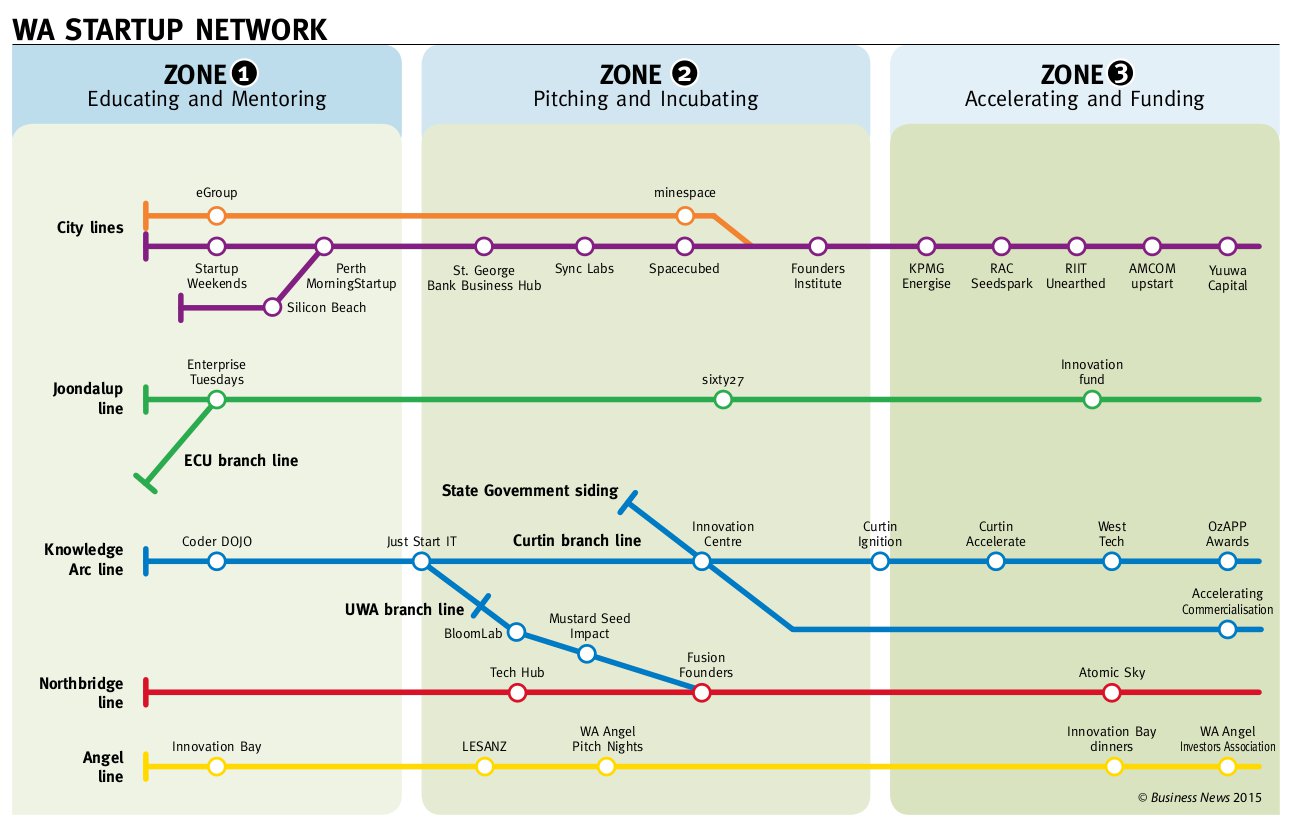Last week I did a talk to BloomLab, the university based co-working space for student startup folk here in Perth, WA. My slides are visible above (and also here).
Here is my 10 “flearnings” (learning from failures) – hard won advice from making the wrong decisions (many times), but learning from them.
- Startups are easy
Wrong, well actually, right – startups ARE easy, initially; as what you are mostly doing at the outset is “buying things”, and, as a board member once told me, “any fool can go out and buy something”. You raise some money, or maybe invest your own (along with friends, fools and family), and/or max out your credit card(s), and then go on a buying spree … buying programmers, office space, cool marketing campaigns, staff, …. It’s a buzz of excitement, and you’re wearing cool clothes, have ditched the jacket and tie, and are in a startup.
Wrong!
Businesses only survive if they are SELLING things, that is, collecting revenue. And that means someone ELSE is doing the buying, from you. Unless you are creating value by solving a problem for them (your clients), they will not buy from you. If they don’t, you ain’t got a business. Startups are hard. Selling is hard work. Not many startups are cut out for it. But everyone should be sales, including (and especially including) the fancy pancy founders and CEO.
2. Build it, and they will come
Wrong! Although ultimately the service should sell itself, very few will do this from the get go.
Also, don’t fall into trap that the next release, the latest new functionality, will solve all your problems. ‘Once we add this feature we’ll be home and hosed’. Nope.
Having a great product is very important (as long as it solves a problem that people will pay to remove), but it’s a necessary, not sufficient, factor in your startup succeeding.
3. We’ve got a great product!
A related fallacy to #2 above. The worst sales person falls in love with their product. The best fall in love with their clients’ problems.
We thought we were building the greatest map-based property web site (even if we were that was irrelevant). We thought we were solving home searching and making it easier. Well, yes we may have been, but they weren’t our clients. They were our users. Our clients were real estate agents, and paying a monthly subscription. We had to solve their problems. What was their problem? NOt selling properties. Properties sell. Buyers seek them out (buyers like to buy, remember? espeically property, especially in Australia.)
‘Getting listings’ is the real estate problem. Good listings. Ones that will sell. Ones that have nice owners. As soon as we realised this, we developed more and more features (including web development and even a magazine) that helped them get listings. ‘List and last’.
Who is paying you? They are your clients. Solve their problems. Full stop.
4. Spend loads of money on ads
If we’d had a bucket load of money for ads, we would have just used it. (There’s that buying itch again!) So what? We might have felt good watching our TV ads, hearing the radio commercials or watching the bus ads zoom by. So may our staff and investors. Would it have brought us revenue? Probably not. So many dotcoms spent huge amounts on advertising (or ‘brand’ as they euphemistically put it), so more people would come to the site, have a ‘meh’ experience, which meant you had to raise more money to get a different set of people to the site. And so on.
Have you ever seen an ad for Google? [Well, OK, I did see this one, and it was great, but it was not a traditional ad in any sense.] Promote the site through making it easy to spread, make it sticky (people stay on), make it elastic (draws people back). This could be about design, in built devices (such as Dropbox offering extra storage if you referred customers), encourage content sharing, etc. Use the free media; journo needs stories. Treat journos & influential bloggers as clients. Take them out for coffee. Don’t just do mass press releases; tailor your media approaches and provide exclusives.
5. Do regular, massive big upgrades
No; keep innovating, but not in a wholus bolus way, as that will ruin things for your users. Changing how the whole site works really annoys your loyal fans. Keep improving things, based on testing and feedback, in an iterative manner. Be fluid, add features, yes, but also think of ways to keeping it simple. UX (user experience) is all important these days. It’s a refined skill, and you will inch (not blast) your way there.
6. There’s either a tech solution or there isn’t
It’s not that cut and dried. The times I was told something was impossible, then the programmers would wander in all sheepishly and show me how they’d solved it (bless their little cotton socks). You get to learn what’s hard and what’s easy. I’ve found a simple truth in all this – it’s never the technology, it’s the people.
7. You’re on your own
Not true! There are multitudes of people out there, probably hammering away at similar type businesses solving similar problems, every day. Network, go to startup events, find people, ask questions, provide value yourself (give and it shall be returned). Years before Spacecubed, Perth Morning Startup, Startup Weekends and the rest, a few internet enterpreneurs still going in the mid 2000s formed ‘eGroup’, as much for the emotional support as anything.
There are now over 30 places and programs you can visit in Perth alone to find alike minded people and support…
View a full list here
8. SEO is a black art & expensive
I learned much of what I know by trial and error, but the importance of ‘title tags’ and ‘H1’ headings were not lost on me. Get these right and 80% of your search engine optimisation is done. Also, hire someone local who knows that they’re doing. (Direct message me if you want to be introduced to Perth people I have used and recommend.)
The SEO and SEM (search engine marketing) ‘industry’, along with social media and web/app development, is not a regulated so anyone can hang up a shingle and claim they have knowledge. Beware of stupid ‘I can put you on the 1st page of Google’ claims, because no one can guarantee that (well, not before knowing what search phrase is important, and how competitive that is, and how your site is written/updated).
And don’t try to cheat the system. Do not engage in ‘black hat’ tactics (hiding white text on white backgrounds, keyword stuffing, content automation and the like) to get a higher ranking. Anything that looks like a shortcut is a shortcut, and could get you blacklisted (removed) from search results. It’s hard work, done over time. It’s cumulative. Google is only trying to find the most appropriate site for the search terms entered, so be that site. Have interesting, fresh content. Change it up and keep posting.
9. Social media is all nonsense / waste of time
Really? How do you view the telephone, email or web sites in general?
Social media is just a communications tool. Use some or all of Facebook, Twitter, Instagram … to engage with your audience, build your brand, learn about your market/competitors and all the other things it can do. Use them as part of your overall strategy. You can’t do everything, so decide what makes sense for you and what you can execute on well. And keep doing it, and keep learning.
Allocate time for it, and who is going to do what. Best case is everyone does some of it, and lends a hand to some degree, in the same way everyone probably uses email or the phone to some degree. Don’t allow it to be addictive. Have a plan, train your staff, measure what you do, keep what works and ditch what doesn’t.
In promotional campaigns, mix traditional advertising and social, and watch the impact of your promotions make a larger impact and last longer.
Do not buy links, likes or followers. Build your social media presence organically (the occasional Facebook promoted post, OK), and watch your Klout score to gauge which activities work the best.
10. I will build for a PC
Think mobile first, because that is now becoming the largest environment online. Build for mobile, and then PC. With a mobile responsive site, you can pretty much have your cake and eat it. 40% of Australian traffic is now on mobile during weekdays, and more than 50% in the evenings and at weekends.
~~
So there you go, 10 flearnings, from 10 failed mistakes I have made (some of many, many more I could bore you with). Despite making loads of these errors, and learning the hard way, we did survive 10+ years, so we did OK…
All the best with your startup!
SLIDES AVAILABLE HERE >> http://www.slideshare.net/CharlieGunningham/so-many-flearnings-my-startup-journey





